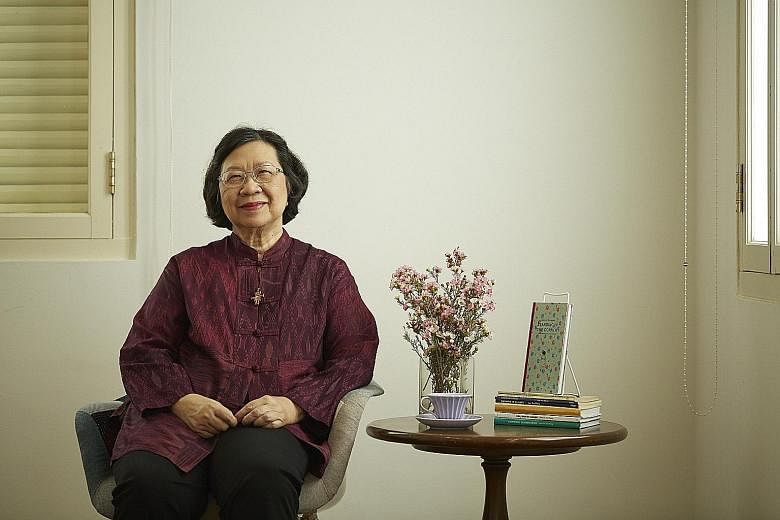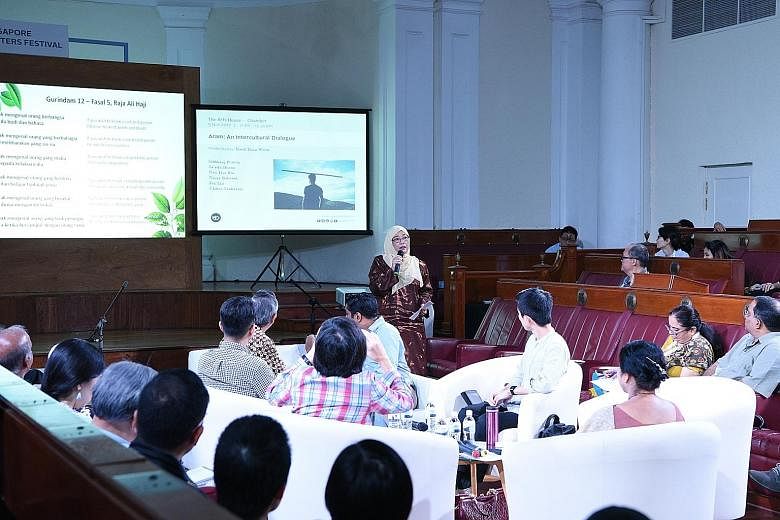It is "not by bread alone" that people can grow as human beings, said Singaporean poet Anne Lee Tzu Pheng yesterday at the Singapore Writers Festival.
"Poetry does not feed a physical hunger," she said. "But I persisted because of how it has allowed me to develop as a person spiritually."
Lee, 71, is the literary pioneer this year for the festival, which is in its 20th edition and runs until Sunday. The 10-day event, organised by the National Arts Council, features more than 300 programmes.
A Cultural Medallion recipient, Lee has written eight verse collections, including Prospect Of A Drowning (1980) and Lambada By Galilee & Other Surprises (1997).
A retired senior lecturer in English from the National University of Singapore, she modestly described her 50 or so years writing poetry as "50 shades of puzzlement".
She struggled with the voices in her poems at the outset. Different voices emerged and she felt they sounded phony.
Although she was skilled at poetic technique, she said she was a "novice at how to bring real life into poems".
-
Practising goodness
-
What is goodness in different languages and how should it be practised?
This question was put forth at the Singapore Writers Festival yesterday morning, as writers and academics debated the meaning of the festival's theme - Aram - across linguistic and cultural boundaries at an intercultural dialogue moderated by Professor Kwok Kian Woon, a sociology professor at Nanyang Technological University.
The event was held at The Chamber at The Arts House.
The polysemous Tamil word "Aram" connotes "goodness" or "doing good" and appears notably in Thirukkural, a classic Tamil text.
Speaking in their mother tongues, the participants - academics Dr Sa'eda Buang, Dr Nazry Bahrawi and Associate Professor Chitra Sankaran; writers Sithuraj Ponraj and Fei Xin; and theatre practitioner Neo Hai Bin - suggested equivalents for Aram in their own languages and strategies to practise it.
The panel's contributions ranged from the recitation of early 19th-century Malay poetry to an irreverent pantun inspired by 1961 film Gado Gado.
Although the notion of purity of mind arose often in discussion, Prof Kwok cautioned against purity devolving into morally problematic purism.
Sithuraj said: "There may be a push to make Aram a set of rules, such as giving to charity, that you can fulfil to feel good about yourself, but I prefer to think of it as giving space to others.
"My job as a writer is to pick up these possibilities for space."
-
Olivia Ho
"If you are too focused on the technical elements - getting the how and what right - you can forget the why. The why, for me, is what makes the poem succeed.
"I have learnt to be schizophrenic," she added, "both as writer and critical reader of my work."
She recalled the difficult early days of the literary scene in Singapore, where writers such as herself still had their imaginations "locked in a foreign landscape" without local predecessors to look up to.
At readings, the number of writers reading often outnumbered the audience.
An early anthology of Singapore poetry, The Flowering Tree (1970), got filed in local bookstores under the Gardening section.
Lee's poem My Country And My People, which she wrote in 1967, met with backlash despite its patriotic-sounding title because of the frank way in which it questioned her national identity. It was even banned from being read on the radio.
Lee, who has one daughter, underwent a hiatus from poetry for many years due to domestic crisis, during which she became almost a "non-person" from lack of writing.
It was her Catholic faith that helped her return to writing and reclaim her personal identity. "Writing is a form of prayer for me," she said. She expressed concern that technological advancement is changing people's vocabulary, with mechanical discourse becoming the new normal.
"We need to hold on to and map interior realities with a language that builds us humanly," she said.
She advised young writers in the audience that a love of words is insufficient to make one a poet.
"It could turn out to be a love affair and not last the course. And if words are what fuel your life, you must accept they will burn you and be a constant source of pain.
"It is never about you as the writer, but the art you bring to society."
More than 340 writers from Singapore and abroad will take part in this year's events. They include acclaimed names such as Pulitzer Prize winners Junot Diaz, Rae Armantrout and Ian Johnson.



